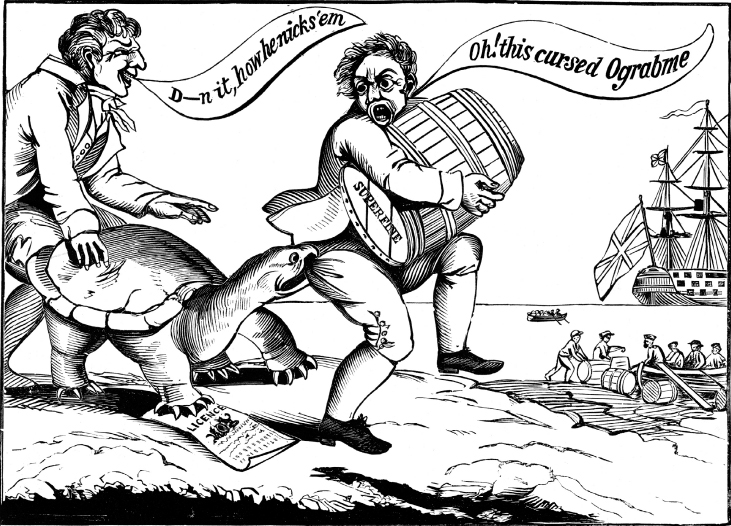Democratic-Republicans Expand Federal Powers

Although Democratic-Republicans generally opposed Marshall’s rulings, they, too, continued to expand federal power. Once again, international developments drove the Jefferson administration’s political agenda. By 1805 the security of the United States was threatened by continued conflicts between France and Great Britain. Both sought alliances with the young nation, and both ignored U.S. claims of neutrality. Indeed, each nation sought to punish Americans for trading with the other. Britain began stopping American ships carrying sugar and molasses from the French West Indies on the pretense of searching them for British deserters. Between 1802 and 1811, the Royal Navy impressed (forced into service) more than eight thousand sailors taken from such ships, including many American citizens. Remembering similar abuses during the colonial period, Americans demanded action. Yet the United States was in no position to launch a war against Great Britain. France claimed a similar right to stop American ships if they continued to trade with Great Britain.
Unable to convince foreign powers to recognize U.S. neutrality, Jefferson and Madison pushed for congressional passage of an embargo that they hoped would, like colonial boycotts, force Great Britain’s hand. In 1807 Congress passed the Embargo Act, which prohibited U.S. ships from leaving their home ports until Britain and France repealed their restrictions on American trade. Although the act kept the United States out of war, it had a devastating impact on national commerce.
New England merchants immediately voiced their outrage. Some merchants began sending items to Europe via Canada. In response, Congress passed the Force Act, granting extraordinary powers to customs officials to end such smuggling. The economic pain spread well beyond the merchant class. Young professionals like Parker Cleaveland were affected by the embargo-fueled recession; he was forced to sell his home to the Bowdoin trustees and become their tenant in 1807. Farmers and planters also suffered the embargo’s effects, as did urban workers, especially in port cities where sailors and dockworkers faced escalating unemployment. The recession raised deep concerns about the expansion of federal power. Congress and the president had not simply regulated international trade; they had brought it to a halt.
In Jefferson’s first inaugural address, he acknowledged that “it will rarely fall to the lot of imperfect man to retire from this station [the presidency] with the reputation and the favor which bring him into it.” Not only had Jefferson failed to contain the powers of the federal government, but the Embargo Act also threatened the livelihood of those who had once seen him as their champion. At the end of his second term, a Philadelphia seaman wrote to him, claiming that because of the Embargo Act he had lost what little he owned and threatening to “throttle his honored neck.”
Despite such sentiments, many Americans still viewed Jefferson favorably. He had devoted his adult life to the creation of the American Republic, and he had purchased the Louisiana Territory, opening up vast lands to American exploration and development. This geographical boon had encouraged inventors and artisans to pursue ideas that would help the young nation take full advantage of its resources and recover from its current economic plight.
Review & Relate
|
How did Jefferson and the Democratic-Republicans contribute to the expansion of the role of the federal government in American life? |
How did the conflict between France and Great Britain in the late eighteenth and early nineteenth centuries lead to domestic problems in the United States? |